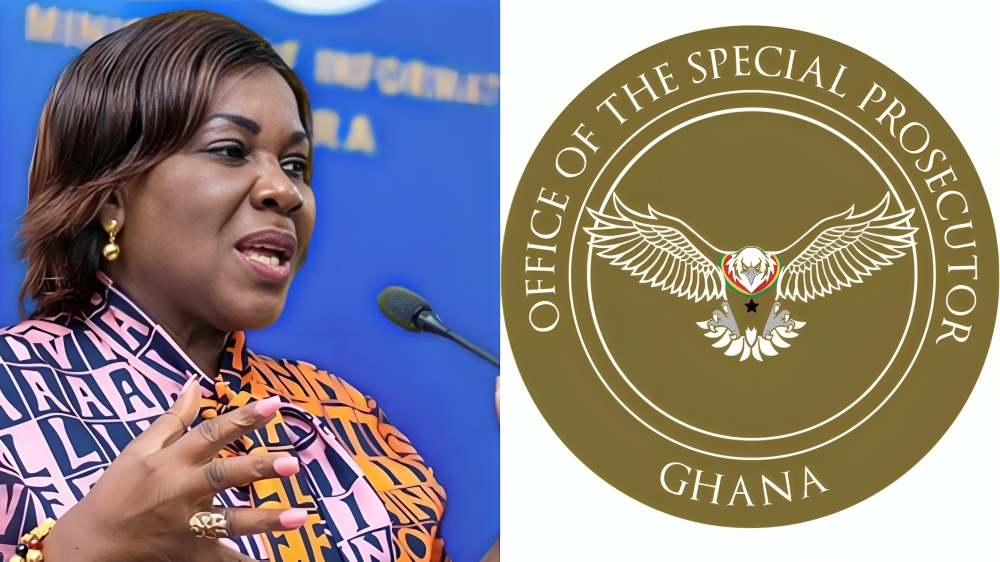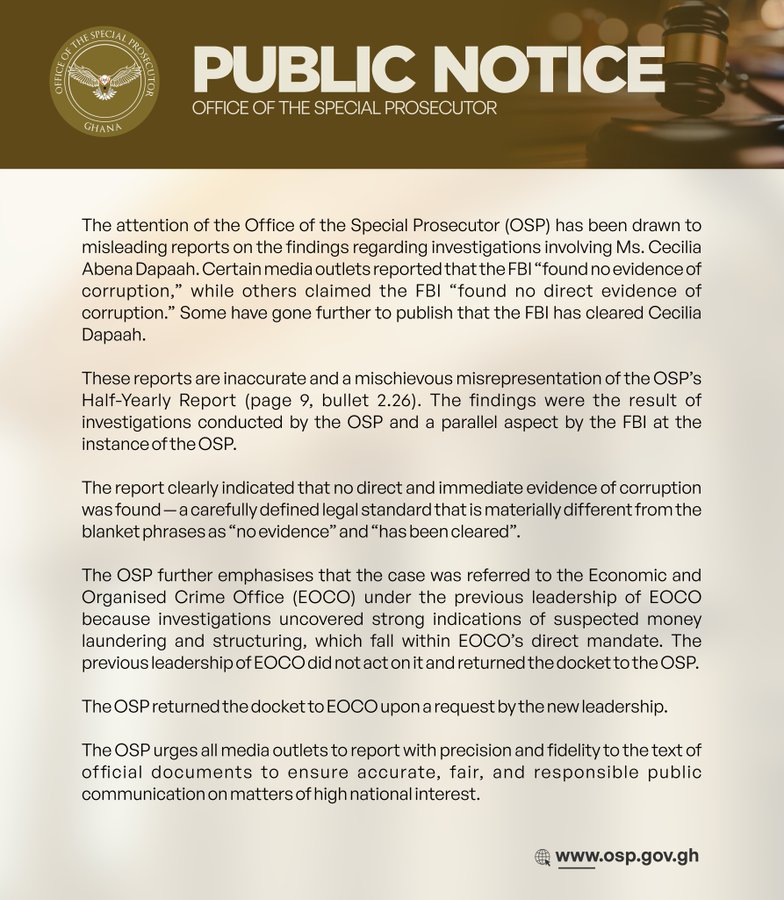OSP disputes "misleading" media reports on Cecilia Dapaah investigation outcome

The Office of the Special Prosecutor (OSP) in Ghana has strongly contested what it characterises as inaccurate media coverage regarding the findings of its investigation into former Sanitation and Water Resources Minister Cecilia Abena Dapaah.
The clarification comes amid widespread media reports suggesting the former minister had been "cleared" of corruption charges following a joint investigation with the Federal Bureau of Investigation (FBI).
Background of the Case
The investigation into Cecilia Dapaah began in July 2023, following a shocking theft case that exposed significant sums of money allegedly kept at her residence.
The alleged thefts occurred between July and October 2022. During this period, the house helps allegedly stole personal effects belonging to Cecilia Abena Dapaah, including assorted clothes valued at GHC95,000 and handbags, perfumes and jewellery worth US$95,000.
Dapaah faced public scrutiny in 2023 for alleged corruption after losing $1 million, €300,000, and an undisclosed amount of Ghanaian cedis said to have been stolen by her house help. The scandal eventually led to her resignation.
The case initially began as a simple theft matter but evolved into a complex corruption investigation when questions arose about the source of such large amounts of cash found in a public official's home.
The theft involved several individuals, including Patience Botwe, the 18-year-old who is accused of stealing most of the money stolen from Abena Dapaah's home; Sarah Agyei, the 30-year-old former house help; and their associates. These individuals were subsequently charged with conspiracy, stealing, and dishonestly receiving stolen property.
The OSP's Investigation and FBI Involvement
The OSP launched a comprehensive investigation following the public outcry over the substantial amounts of money allegedly stolen from Ms Dapaah's residence.
The investigation was conducted jointly with the FBI, which became involved at the OSP's request to ensure thoroughness and international cooperation in examining potential financial crimes.
READ MORE: Majority caucus demands annulment of Ayawaso East NDC Primary
Investigators reportedly tracked $5 million and GH¢48 million in various financial transactions as part of their probe. The investigation spanned over a year and involved extensive financial analysis and evidence gathering.
OSP's Official Response and Clarification

On Monday, August 19, 2025, the OSP issued a strongly-worded statement addressing what it termed "misleading" and "mischievous" media reports surrounding the outcome of investigations into Ms Cecilia Abena Dapaah, the former Minister for Sanitation and Water Resources."
In a statement released on Monday, August 19, the OSP expressed concern over claims by several media outlets that the Federal Bureau of Investigation (FBI) had either "found no evidence of corruption" or had "cleared" Ms Dapaah following a joint probe.
Some reports cited the OSP's own half-yearly report as the basis for these claims.
However, the OSP refuted these interpretations, describing them as a distortion of the findings laid out in its official report, particularly section 2.26 on page 9. The OSP referenced their half-yearly report, which is available at: OSP Half Year Report
The OSP took particular issue with media outlets that cited its own half-yearly report as supporting these claims, arguing that such interpretations represented a fundamental misunderstanding of the legal language used in official investigative reports.
Key Distinction in Legal Language
The OSP emphasised a crucial distinction in its findings, explaining that the sentence, "no direct and immediate evidence of corruption was identified during the investigations," is a legally nuanced finding that differs materially from the sweeping claims that there was "no evidence" at all or that Ms Dapaah had been "cleared".
This nuanced legal language reflects the high evidentiary standards required in corruption cases while acknowledging that investigations may reveal concerning patterns that don't meet the threshold for direct corruption charges.
Money Laundering Concerns Remain
The investigations in question involved both the OSP and the FBI, with the latter's involvement being initiated at the request of the OSP.
READ MORE: Baba Jamal wins Ayawaso East NDC parliamentary primary
Despite the limited findings, the OSP stressed that its probe uncovered "strong indications of suspected money laundering and structuring"—matters that fall squarely within the jurisdiction of the Economic and Organised Crime Office (EOCO).
According to the OSP, the case was initially referred to EOCO under its previous leadership. However, EOCO allegedly failed to act on the matter and returned the case docket to the OSP. The new leadership at EOCO has since requested and received the docket to proceed with the relevant investigations.
Implications of the Case Transfer
The transfer of the case to EOCO for a money laundering investigation suggests that while corruption charges may not be viable, serious questions remain about the financial activities surrounding Ms Dapaah's wealth.
Money laundering and structuring charges can carry significant legal consequences and represent a different avenue of prosecution focusing on how funds were handled rather than their original source.
Call for Media Responsibility
The OSP used the opportunity to call on media organisations to exercise greater care and precision in their reporting, particularly on issues of significant national concern.
In the concluding remarks of their statement, the OSP emphasised, "The OSP urged all media outlets to report with precision and fidelity to the text of official documents to ensure accurate, fair, and responsible public communication."
This call for media responsibility highlights the important role that accurate reporting plays in public understanding of complex legal matters and the potential consequences of misinterpretation in high-profile cases.
Current Status and Next Steps
With the case now in EOCO's hands under new leadership, the focus shifts to investigating potential money laundering and financial structuring violations. This represents a different legal approach that could still result in significant consequences for Ms Dapaah, despite the absence of direct corruption evidence.
The case highlights the complexity of financial crime investigations and the importance of precise legal language in official reports. It also underscores the ongoing challenges in Ghana's fight against corruption and financial crimes, particularly involving high-profile public officials.


